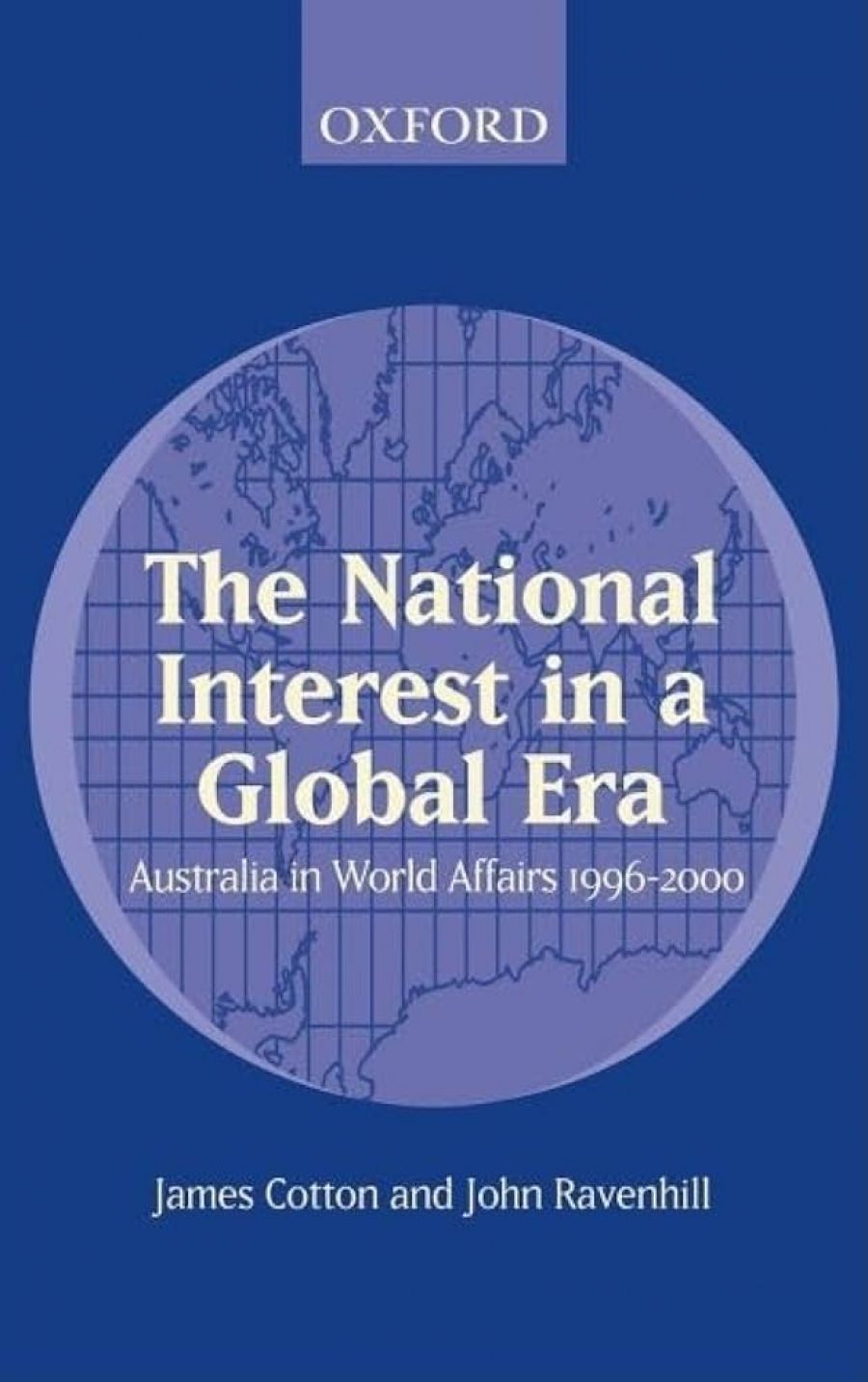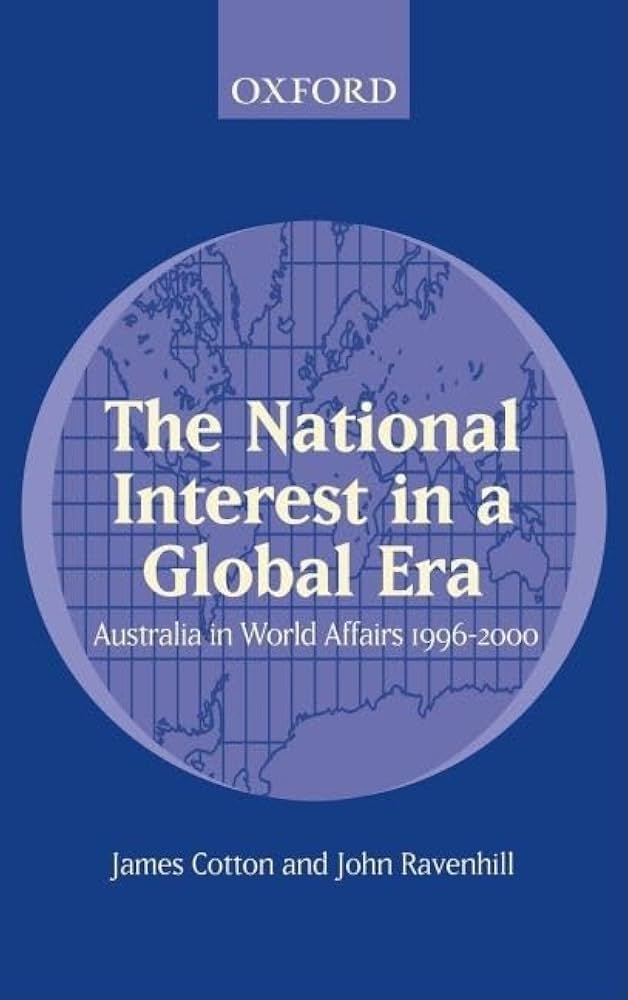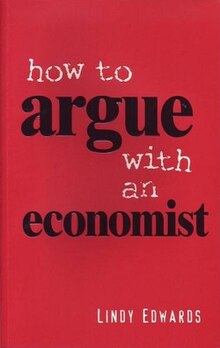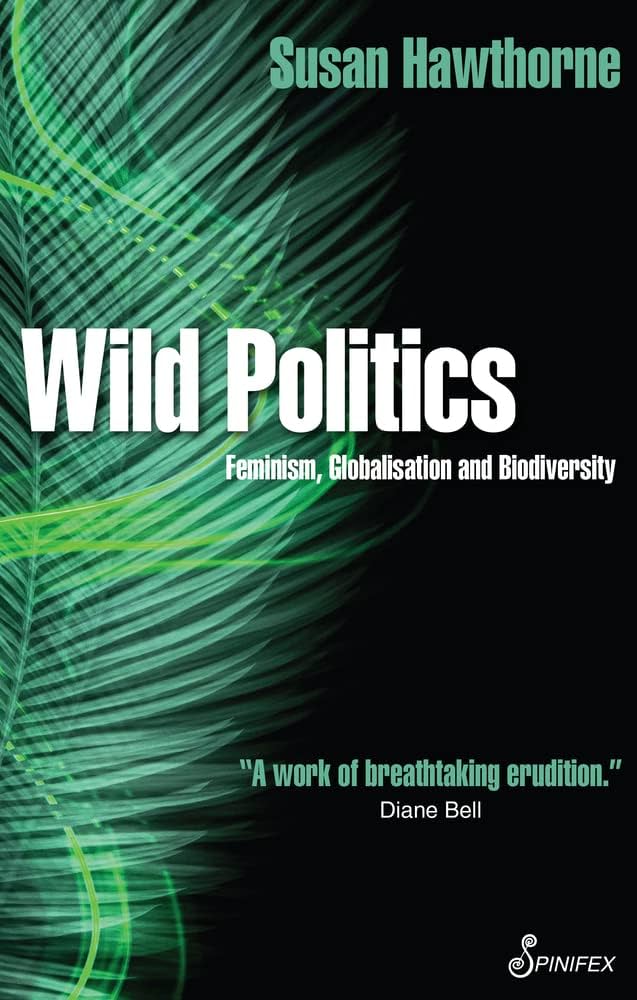
- Free Article: No
- Contents Category: Politics
- Custom Article Title: Allan Patience reviews 5 Books
- Review Article: Yes
- Article Title: It's Not That Simple, Stupid
- Online Only: No
- Custom Highlight Text:
I was once berated by a lecturer in political theory for my undergraduate defence of Marxist economism. He pointed out that even Marx despised this mindless reduction of his work. I subsequently opted for less anal accounts of the human condition, and remain of the view that any half-intelligent person would do likewise. So I was more than astonished to hear non-Marxists of the ilk of Ronald Reagan, Margaret Thatcher and the senior George Bush demanding that we read their lips as they mouthed: ‘It’s the economy, stupid!’
- Book 1 Title: The National Interest in a Global Era
- Book 1 Subtitle: Australia in world affairs 1996-2000
- Book 1 Biblio: OUP, $44.95pb, 377pp
- Book 1 Cover Small (400 x 600):

- Book 1 Cover (800 x 1200):

- Book 2 Title: How to Argue with an Economist
- Book 2 Subtitle: Reopening political debate in Australia
- Book 2 Biblio: CUP, $27.95pb, 171pp
- Book 2 Cover Small (400 x 600):

- Book 2 Cover (800 x 1200):

- Book 3 Title: Wild Politics
- Book 3 Subtitle: Feminism, globalilsation, biodiversity
- Book 3 Biblio: Spinifex, $29.95pb, 462pp
- Book 3 Cover Small (400 x 600):

- Book 3 Cover (800 x 1200):

Well, it’s not the economy, and never has been. But today we are encircled by born-again libertarians and market fundamentalists who are utterly convinced that the economy is the fons et origo of everything else that matters. They are constantly proclaiming simplistic explanations of political economy that bring them attention and influence, and ever greater shares of capital for their mates, all in a world that is radically transforming itself in the name of globalisation. But this reductive political economy keeps its true believers narrowly blinkered from the enormities of the globalisation process.
Joseph Stiglitz’s Globalization and Its Discontents is a fascinating mixture of disinterested scholarship and insider knowledge of the World Bank, where the writer was Chief Economist until 2000. He was also an adviser to President Clinton, and is now a professor at Columbia University. He won the 2001 Nobel Prize in Economics. His knowledge of the rampant economistic orthodoxies of our times is comprehensive, and he writes with all the advantages of hindsight.
In some respects, Stiglitz’s book is like Robert McNamara’s recent account of the Vietnam War. McNamara was directly responsible for much of America’s engagement in that war, only to write later of how he knew at the time (as did a number of senior military and political leaders, including at least two US presidents) that it was a doomed exercise almost from the beginning. When powerful leaders suddenly confess publicly that they were wrong, you may be allowed some smugness in recalling your previous oppositions to their policies. But their candour when admitting errors of judgment -errors that caused many deaths, much suffering and huge destruction - is not a little unnerving.
That’s rather the feeling you get from Stiglitz’s book. He reveals that much of the work of institutions like the World Bank, the IMF and the WTO - work he has been directly involved in - is systematically failing to address world poverty, to limit environmental destruction or to stabilise the global economy. In all likelihood, these supra-state organisations are aggravating - maybe they are even the root cause- of many of the contemporary problems that give rise to so much global despair, violence and even terrorism. They represent what Richard Falk has labelled ‘predatory globalisation’ - a ruthless shifting of food, energy, education and health resources from the world’s poor majority (and it’s getting poorer) to the rich minority who are getting richer and mainly live in the USA (and who still don’t understand why they are increasingly hated around the globe). And, as Stiglitz shows, so much of this misguided and misanthropic global administering is based on an economics that is simply incapable of providing the policy ideas and practices necessary to end predatory globalisation, to nurture the intelligent growth of international civil society and to promote global security.
Australia’s contemporary contributions to global security and human civilisation appear rather meagre in Cotton and Ravenhill’s edited volume. The main theme of these essays is that Australia’s sense of its national interest became tighter, less adventurous, imaginative and robust - at times even meanspirited - during the period covered by the book (1996–2000). Questionable assumptions about Australia as a respectable middle power are painfully evident in our current foreign policy, where bilateralism rules at the expense of our involvements with the United Nations and its major organs (especially in the area of human rights), and with regional associations like ASEAN. As a result, our international respectability is under a cloud and our middle-power aspirations are increasingly awry.
Are Australia’s security and its capacity to influence international affairs improved by these developments? Are we seen as a solid citizen-state in world affairs, offering sensible leadership where we can and should? Increasingly, we’re not. Milner highlights a ‘serious degree of pessimism about the progress of the nation’s Asian engagement’. He concludes that we ‘run the risk of promoting a comfortable and even complacent Australia, rather than the tenacious, resourceful, and Asia-sophisticated community called for in the Coalition’s White Paper of 1997’. May and Regan point out that in the South Pacific, where the world expects us to be a leader, and which is the only region in which we can exercise any real influence, we are reluctantly, ineffectually involved with states that are weakening by the minute and whose governance is in severe decline. Some of this is Australia’s fault. William Tow thinks we are best served by an alignment with ‘a United States that remains favourably inclined towards Australia’, even as we explore what he calls our ‘intra-Asian destiny’. Yet what this is, and how we pursue it, is what we have been retreating from for several years. And none of this foreign policymaking seems formulated with a clear appreciation of what globalisation could entail for the country.
What The National Interest in a Global Era doesn’t canvass, because it is beyond its cut-off date, is the whole asylum-seeker issue, with its so-called ‘Pacific Solution’. This renders the book a bit obsolete even before it gets off the ground. But that is the problem of arbitrary dates and volumes such as these - which are nonetheless useful as contemporary history and invaluable for critical students of International Relations, of whom there are too few in Australia today.
Peter Saunders’ book is acutely conscious of the libertarian economism that is worrying the post-World Bank Stiglitz, though it is less preoccupied with the problems - or promises - of globalisation. But the book is a ringing damnation of the libertarian attacks on the welfare state by governments of all shades in Australia over the past quarter century. Should welfare policies be the direct responsibility of governments, via the mechanisms of a bureaucratised welfare state apparatus? Or are they more cost-effectively and efficiently handled by private welfare organisations (with some government assistance)? As Saunders notes: ‘Australian social security policy has become obsessed with debate over means rather than ends, driven by an overriding need to cut costs.’ Along the way, unemployment, family and community breakdowns, and psychosocial pathologies (suicide, drug addiction, crime and violence) have been increasing, sometimes at horrifying rates. Are social security programmes put in place simply as safety nets, to ameliorate social change (especially as its rate is influenced by globalisation)? Or are they part of a much larger affair? Do they belong to a nation-building strategy (via community development)? And who decides on when the state should intervene or remain aloof?
Saunders presents an impressive case to show that the economism of the dominant public policy libertarians is failing, abjectly. The growing socioeconomic inequalities in our midst - that in Australia are micro-reflections of what is happening at a global level - are in fact stalling economic growth and undermining social harmony. Saunders’ responses to this are cautious, realistic and moderate. His book implies rather than explicates the need for a vast rethink in the way we fit economic policies and social policies together. What he does show, convincingly and eloquently, is that it is not simply the economy, stupid.
So this is where Lindy Edwards’ sublime little book comes in so handy. Like Stiglitz, Edwards is an economist who has been on the inside. She once advised the Howard government on economic policy, and for a while was an economic adviser to Senator Natasha Stott-Despoja. Now she is an academic researcher at the ANU. Thoughtful people who feel the need to debate the libertarians, yet are easily intimidated by their economism, could profitably start with Edwards’ book. What she does is make bigger, more technical books criticising libertarian economism so much more accessible: books such as Pusey’s Economic Rationalism in Canberra, Stretton’s Economics: A New Introduction, and Keen’s Debunking Economics. How to Argue with an Economist sets out an account of the grim intellectual divide that separates politicians and policy advisers, on the one hand, from the general public, on the other, over the issue of how the economy should be run. The former are almost entirely in the ‘It’s the economy, stupid’ camp. The latter know from harsh reality that our leaders and their advisers are getting it very screwed up. As Edwards notes: ‘The fabric of a national culture is woven together by thousands of different threads. How we organise our economy is an important, even foundational, thread, but it is not the only thread.’
Edwards warns against one-thread reductionism -or ‘economic rationalism’ - that has deeply wounded contemporary Australian governance and alienated many voters from the political system. She alerts us to the basic misunderstandings of economics that have brought about (even inflamed) this toxic state of affairs. She points out that: ‘The market can be understood not as a natural system created by God [or an Invisible Hand], but as a social system created by people.’ This system is there to negotiate problems of scarcity - who gets what and why in an economy where there is not enough for everyone to be rich (no matter how aspirational we may be). In a democratic state that is relatively affluent, like Australia, this has mostly been a fairly civilised process. In economies where there is not enough for many to be even relatively comfortable, the powerful make these decisions, usually in their own favour, enforcing them with guns and repression, becoming rich in the process, while everyone else gets poorer. Edwards notes how the contemporary reductive economism perverts relationships, ignores identities, narrows lifestyles and distorts good markets. To remedy this we need better education (especially for economists) producing people who are alert to notions of justice and sensitive to sustaining human values. How do we get to that level of intelligent civilisation?
Susan Hawthorne’s Wild Politics offers us some riveting answers to this critical question. Her book is passionate in conception and broad in scope. It is multilayered and richly esoteric, in the best sense of this word. It bristles with ideas and possible strategies. Its sweeping and damning judgments and insistent focus on the closely related crises that are building in environmental and human affairs make it compulsive reading. Like the Ancient Mariner’s fixed eye, the book compels you to give it all.
Above all, Wild Politics demonstrates that there are richly feminist ways of philosophising. They are marvellously different, yet related and mostly accessible, from conventional (call them patriarchal or even phallocentric) ontologies, epistemologies and moralities. A powerful feminist sensibility (this is not a contradiction in terms) informs every line in the book. It is imbued sometimes with anger (part of being ‘wild’), sometimes with forceful logic, massive detail and lists of data, sometimes with poetic prose and whimsical strategies. It demands that in nature, and in our imaginative accounts of it, diversity be recognised and valued, but not controlled in conventional patriarchal terms, for human purposes of civility, society and community. Wild Politics energetically contradicts the libertarian economism and ‘predatory globalisation’ of contemporary world politics. ‘It is a springboard for a different kind of approach, one that respects the interactions between humans and our environments, and suggests some ways of limiting the levels of destructiveness that are often taken for granted; justified on economic grounds; and increasing in intensity on more and more fronts.’ So we are taken on a big dipper ride through theorising about human diversity, biodiversity and the forces and forms of production working against these goods.
The difficulty with all this is that, in seeking a ‘wild’ way out of our current dilemmas, Hawthorne relies on a set of assumptions that lie inevitably in a ‘natural’ world that is every bit as ‘red in tooth and claw’ as the grim, patriarchal, overly modern economism that seems to be its alternative. Can lions lie down with lambs? Not in a state of nature. We have to find a different, probably spiritual, ontology to free us from the iron cage of rationality. Hawthorne takes us to the door of the cage, but has not yet supplied the key to unlock it.
At the very least, these books add up to a powerful case that we are nearing the end of the era of destructive libertarian economism. What’s next on the agenda remains to be seen. There may be glimpses of it in Hawthorne’s book, while the others reviewed here remind us why we need to be thinking outside the circle. And most of all, they make it clear that, if we think it’s only the economy, then we’re very stupid.


Comments powered by CComment